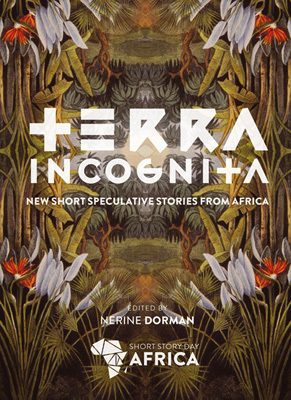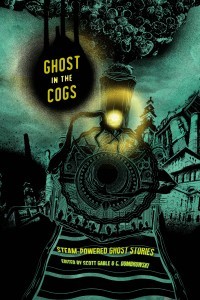Cat Hellisen's Blog, page 5
September 20, 2017
Amy Ross talks Jek/Hyde
Amy Danziger Ross is the author of Jek/Hyde, Harlequin Teen, which is coming out on 3rd of October. She also wrote the Diary of a Haunting series, under the name M. Verano.
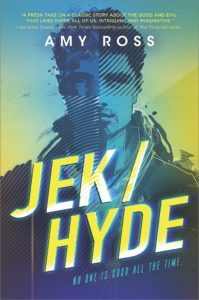
Hi, and welcome, Amy. As a reader and writer you’ve always been interested in the gothic, but what was it about Robert Louis Stevenson’s Strange Case of Dr Jekyll and Mr Hyde that drew you to a modern rewrite for teenage readers?
First of all, it’s simply a great story. I knew right away that I could have a lot of fun reimagining it and putting it in a new context. But most of all, I wanted to bring the story to a new audience.
The weird thing is, everyone knows the names Jekyll and Hyde, but very few people these days have read the original. The names and the concept have a really solid place in popular culture, but that means most people think they know the story better than they really do.
I didn’t read it myself until a few years ago, when I was taking a class on Gothic literature. I wasn’t excited to read it, since I felt like I knew the ending, so the story couldn’t hold any surprises for me. I was very wrong! In my mind, the story was a simplistic parable about good versus evil. It was only in reading the original story that I discovered it’s a strange, subtle, and sophisticated inquiry into psychology, morality, and philosophy.
I was also surprised by how disturbing the story is, even when you know its “twist”. If anything, it only makes the creeping horror and suspense all the more powerful. It turns out that surprise isn’t a very important component of horror – what’s really effective is the building sensation of dread as you see how far Hyde will go before his secret gets discovered. That sense of powerlessness as you watch a story unfold is key to this particular kind of horror, and I was excited to try to capture that feeling in my own words.
I also think we’ve entered a perfect time for adapting these old Victorian works. In the days before telephones, plots often hinged on written correspondence: notes, telegrams, letters. Oddly enough, we’re experiencing a kind of second-coming of that approach – text messaging and social media posts slot in surprisingly well for those old, written formats.
On a deeper level, we’re at a moment where stories about the complexities of identity have a new weight for us. A big part of updating the story for me was not just to recreate the philosophical and moral dilemmas of the Victorian era, but to engage with new concerns that might not have occurred to Stevenson – about race and gender and privilege, for example.
Both of us have incorporated mind-altering drugs, etc, into our works, and one of the key points of J/H is that interplay between what is the real and what is the revealed. Did you ever feel the pressure to tone elements like that down? I’ve been rereading some of the work I enjoyed in my teens, and one thing that strikes me is how much less moralising the work was. Do you think readers have changed in what they want or even need from stories now?
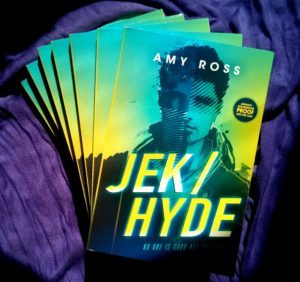
That’s interesting! We’re about the same age, but my experience is different – I remember teen-lit from my day being *extremely* moralizing, especially about sex and drugs. Back then, if a character popped open a beer on page 5, you could be guaranteed they’d die in a drunk driving incident by the end. And while characters could have sex, no one ever enjoyed it.
But in my career, I haven’t gotten any resistance at all on my portrayals of sex, drugs, and drinking, even though Jek/Hyde is pretty risque in those respects. Nowadays, the attention is focused on social justice issues. It’s what’s in the air right now.
What would you recommend to a reader who enjoyed Jek/Hyde and do you have plans to tackle any other gothic novels or novellas for a new audience?
Obviously, my primary inspiration was the original Dr. Jekyll and Mr. Hyde. I reread it very closely as I was preparing to work on this book: I took copious notes on every plot detail, every character, even details of tone and setting, so I could incorporate as much as possible into my novel. I’ve seen quite a few adaptations of this story that take the bare bones of a concept as a jumping off point, but then go in an entirely different direction. That can be fun too, but I set myself the challenge of keeping Jek/Hyde as close to the original as possible, given that I was moving the story from adult bachelors in Victorian London to teenagers in modern-day suburban America. For example, Stevenson talks about the air in London being thick and brown — natural enough, due to the pollution caused by recent industrialization. That didn’t make sense in my version, but it inspired me to create LondonChem, an agrichemical/pharmaceutical company whose environmental impact may also be causing sludgy, brown air.
Probably the next biggest inspiration was the BBC TV show, Sherlock, which I’ve been basically obsessed with since I first saw it three years ago. When I first heard they were doing a contemporary version of the Sherlock Holmes stories, I thought it was a terrible idea — but in fact it’s absolutely brilliant. Steven Moffat has said they wanted to blow the cobwebs off the old stories and help people see how modern they truly are. That idea was very much in my mind as I wrote Jek/Hyde. We think of ourselves as very different from (and better than) the Victorians, but that world is still with us in many odd ways, lurking just beneath the surface. I tried to capture that, especially in the scene when Jek and Lulu are browsing through the junk shop, flirting and playing amid objects that would have been modern to Victorians — including a walking stick like the one that plays a crucial role in the original story.
I also had in mind early sci-fi like Frankenstein, for its ambivalent attitudes toward science. I don’t think that trope ever gets old, though every generation will have a different take on it.
As for modern influences, I saw this story as a way to playfully tweak the ubiquitous (and in my opinion unfairly maligned) YA trope of the “love triangle”. Love triangles are a part of life, and they lend themselves naturally to dramatic situations, so I don’t object to them in fiction… but I had fun subverting the device by creating two love interests who are actually the same person (and are arguably more obsessed with each other than with the heroine).
You mentioned one of your influences for Jek/Hyde was the Moffat and Gatiss take on a modern Sherlock. Do you ever feel that books or shows like Sherlock BBC blur the distinctions between traditional fiction and fanfiction? What do they bring to the table in terms of story-telling and freshness?
That’s an interesting question! To start with, I’m not sure there’s ever been a very clear distinction between fiction and fanfiction. Fan-writers often put it in terms of “fanfiction” vs “original work”, but in that case, where does Jek/Hyde stand? The concept for the novel is very explicitly not original but derivative. Or we could, as you did, make a distinction between fanfic and “traditional fiction” – but what could be more traditional than fanfiction? From Dante to Shakespeare and beyond, writers have always been borrowing from and building on each others’ stories.
That said, I don’t want to just throw up my hands and say “all fiction is fanfiction”, because I do think there are useful distinctions to be made. Just the other day, I saw that a new book called “The Fanfiction Reader,” defines fanfic as “creative material featuring characters [from] works whose copyright is held by others”. That strikes me as a pragmatic if unromantic perspective. In that case, Jek/Hyde isn’t fanfic because the original is in the public domain, therefore I am free to profit from it. Fanfic is defined as “what you could be sued for.”
Of course it all depends on definitions, but in many ways I think Jek/Hyde does qualify as fanfic. I certainly wrote it out of a deep love for the original, and a desire to pay homage to it. And yet, there are other ways that it feels different to me. Like any genre, fanfic comes with its own conventions and reader-expectations. It’s very interesting how, for better or for worse, fanfic has become a bit calcified by certain tropes and structures. The Edenic dream of fanfic is that, without the interference of publishing “gatekeepers”, a truly diverse literary ecology will grow and flourish. But anyone who haunts fanfiction.net or AO3 knows that is not really the case – yes, in theory fanficcers can write whatever they want, but in practice they mostly take non-romantic stories and refashion them into conventionally-structured romances. That’s what gets hits, kudos, comments, and recs, which effectively produces a new kind of gatekeeping.
For what it’s worth, Jek/Hyde doesn’t go in that direction. There are romantic elements to the plot, but it is not, to my mind, a romance – if anything, it’s more about the dangers of human relationships than the pleasures and satisfactions thereof. Is that enough to make it “not fanfic”? I don’t know. Certainly there are stories on AO3 that also resist the standard conventions, as well as traditionally-published novels that conform to them. I’m not sure there’s any clear distinction that is going to work in 100% of cases. But I don’t think there needs to be. There’s always going to be a lot of overlap and cross-pollination between fanfic and “traditional” fic (or whatever we want to call it). At the same time, it’s interesting and worthwhile, I think, to look at the forces, both explicit and unacknowledged, that influenced and inspired different kinds of stories.
Thanks so much for visiting the blog and chatting with us. I hope you have a fantastic launch in a few weeks’ time. 
September 19, 2017
Question Time with Suzanne van Rooyen
Earlier this month I posted my Not-Review of Suzanne van Rooyen‘s I HEART ROBOT.
Today I’m talking to them about robots, AI, music,and emotions. So, a warm welcome to the wonderful Suzanne! My question for them is:
How would you feel if an AI was created that could out-perform and out-emote any modern day musical performer?

Hi Cat,
Thank you so much for having me on your blog today. You asked me a rather tricky question that I’m going to attempt to answer…
Being a musician myself, my gut reaction to this question was ‘that’ll never happen.’ Then I had to take a step back, because this conceit is pretty much the premise of my novel I Heart Robot.
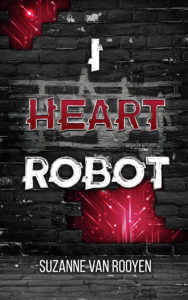
To adequately answer this, I need to unpack the question a little more. Firstly, what does out-perform mean? I’m going to interpret this as the technical ability of the musician, the speed and accuracy with which a pianist can hit the notes, the embouchure and air pressure control of a flutist, the speed and accuracy of both bowing and fingering for string players. Could a robot out-perform a musician in this context? Absolutely. And the scary thing is, these robots don’t even need to be particularly smart to do it. They don’t have to be smart at all.
There’s a fantastic music video by Nigel Stanford for his song Automatica which shows fairly basic assembly line robots playing guitars, drums, piano, and even spinning the decks on a DJ desk. This is entirely plausible, and the dexterity this would take is easily programmed into machines of this sort.
If you were to add AI to this scenario, giving the robot the ability to learn and adapt, I have no doubt a robot – even a non-anthropomorphic one – could out-perform a human musician.
Out-emoting a human being, however, that is rather different. Being able to add expression to one’s playing is no easy task. Even some of the most gifted musicians struggle with this. Having excellent technique can be relatively easily developed, but being able to evoke specific emotion in an audience is something many people consider an innate ability, and not one easily acquired.
Having done my Master’s in music perception and cognition, I have to disagree a little here. From numerous studies on music and the brain, and numerous studies on how music affects emotions, music scientists have a pretty concrete understanding of how and why music makes us feel certain things. Combine certain elements of music (timbre, texture, tempo, dynamics) in the right way and you are pretty much guaranteed to make the listener feel sad or happy, angry or afraid. While I hate to reduce emotion in music to a recipe, I have to admit that you most certainly can, and recipes like these robots can learn.
When I was at university, one of the research teams developed a clever little app that would listen and analyze music in real time. A ball would then bounce around the axes of the five basic human emotions, denoting the music to be happy or sad etc. We deliberately went out of our way to confuse this app, but rarely managed to.
Our emotional response to music can, sadly, be reduced to a set of scientific principles based on how our brains analyze and process sound, as well as our social and cultural conditioning. When we listen to Chopin’s Funeral March we know that it is not only the minor chords that evoke such a strong emotional response in us, but also the tempo at which it is played, the way the musician leans on certain tones, delays the harmonic resolutions of dissonance, and plays with the dynamic range of the music. If we took several different performances of Chopin’s piece and analyzed how every human musician performed it, creating averages for how great the crescendo was, how long a single fermata was – if we analyzed all the minutiae, we could potentially create a blue-print for the perfect performance. These details – reduced to mathematical formulae – could then be given to a machine. Essentially, we could programme a robot to play like Horowitz or Lang Lang or – arguably, better still – as an amalgam of all the greatest pianists to have ever lived. Surely then, this robot would out-emote any human performer, wouldn’t it?
That’s a question I can’t answer. Part of what makes Lang Lang so appealing to certain listeners, or why others much prefer Horowitz to Ashkenazy, is because of individual idiosyncrasies of the player. Amalgamate those personalities and perhaps you’d be left with a bland performance by comparison. However, imagine that as a starting point. Imagine an AI capable of analyzing, imitating, and assimilating the best performances by the world’s most beloved performers with unparalleled, flawless technique. I think then, we may be in for a rather nasty surprise.
As much as I don’t want to admit that a robot – perhaps like Quinn in I Heart Robot – could ever out-emote a human musician, I also have to be honest that I don’t think it’s impossible.
September 7, 2017
I HEART ROBOT – a not-review by Cat
Q-I-99, aka ‘Quinn,’ lives in a scrap metal sanctuary with other rogue droids. While some use violence to make their voices heard, demanding equal rights for AI enhanced robots, Quinn just wants a moment on stage with his violin to show the humans that androids like him have more to offer than their processing power.
Tyri and Quinn’s worlds collide when they’re accepted by the Baldur Junior Philharmonic Orchestra. As the rift between robots and humans deepens, Tyri and Quinn’s love of music draws them closer together, forcing Tyri to question where her loyalties lie and Quinn to question his place in the world. With the city on the brink of civil war, will Tyri’s and Quinn’s passion for music be enough to hold them together while everything else crumbles down around them, or will the truth of who they are tear them apart?

YA SF novel I HEART ROBOT is getting a relaunch, and I had the opportunity to read an arc. It’s been a while since I’ve indulged in some young adult work, as I’ve gone through a bit of a break-up with the genre, but I was pleasantly surprised at how much I enjoyed this.
It’s a quick, engaging read, and main character Tyri is totally relatable as a teen finding her place in the world and pulling against parantal restraints. Enter Quinn, an android originally created for human pleasure (and abused by his previous owners, which adds an extra level of poignancy to his desire to be like humans), and his struggle to become more human while still accepting that he will never be “living” is beautifully captured. The two characters’ interaction and relationship could have been built up a little more for me, but individually their storylines worked, weaving together in a satisfying way. For all the setting is a near-future fictional Scandinavian country – a future populated by androids and service bots who work alongside humans but have no human rights – it’s enough like our own time to easily slip into without extensive info-dumps to guide the reader.
Without giving too much of the plot away, the signs for the reveals and wrap-ups are all in place, and nothing feels like it comes out of left-field. There were sections where the story felt a little rushed to me, or where scenes felt glossed over, but this wasn’t too much of an issue as I expect a faster pace for teen reads. For all that the audience is young, the story doesn’t pander to them with black and white, with moral absolutes, and the book will spark some very interesting classroom discussions on the nature of terrorism, freedom-fighting, human rights, and when we decide someone has those rights.
Van Rooyen has a background in music, and her two protagonists are both violinists competing for a solo spot in a junior orchestra. Her love of music infects the narrative and colours the way her protags see the world, which is a lovely touch.
I HEART ROBOT reminds me somewhat of the TV series HUMANS, so if you enjoyed that and are looking for something suitable for a younger audience, this is a perfect choice. Recommended for 13 +.
About the author: Suzanne is a tattooed storyteller from South Africa. She currently lives in Finland where she finds the heavy metal soothing and the cold, dark forests inspiring. Although she has a Master’s degree in music, Suzanne prefers conjuring strange worlds and creating quirky characters. When she grows up, she wants to be an elf – until then, she spends her time (when not writing) climbing, buying far too many books, and entertaining her shiba inu, Lego.

September 6, 2017
Looking back at The Great Trek.
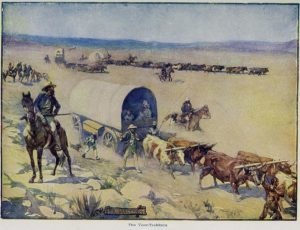 No, not that one.
No, not that one.
This one:
But seriously. I don’t know how it is for other writers (we’re all different even though there are overlaps), but when I am done with a book, as in it’s close to a finalish stage, I have NO IDEA how I managed it. The thought of starting again with a first draft is horrifying. Like having climbed Everest, starved, weather-beaten, exhausted, only to be told, “lol actually here’s ANOTHER EVEREST!”
The weirdest part is if I look back at old novels, I can’t actually picture myself having made that thing. And that it must have been a fluke and I’ll never make another. Sometimes when I go back to old drafts I close them in despair because there’s no way I could finish them because I’ve become a worse writer, and everything is broken. EVERYTHING. The book is broken, my head is broken, I can’t word even.
I don’t know how to get started on another book. I don’t know what to tell people who go through the same wrenching despair at the thought of having to write from the start again, knowing how much work lies ahead. How much terrible, terrible writing.
I can tell you that somehow I do manage it. Sometimes it takes me years to finish book, and I have works in progress that have been lying in the splinters of their own bones, choked on their force-fed feathers, abandoned for years. I tell myself one day i’ll come back, but it never seems to be the right day.
The Three Faces is done for now, though. My agent has a draft, and my Alpha Reader has given it the thumbs-up, so I am hopeful there will be forward motion on it this year or next, and in the meanwhile I will play with a book I’ve been writing on and off for a wee while. It’s written in snatches and snippets of waking dreams, out of order, out of context, out of any kind of rational narrative. But it makes me happy. Sometimes happy is all we can ask for after we’ve finished a novel.
If I have to try and work on something now that I think I could sell, I’d probably just cry. So instead I play.
If you can’t work, perhaps it’s time to choose joy over cash – whether that means fanfic, or watching movies, or whatever. Very, very few of us have to earn a living writing. Don’t feel like you have to be churning out a book every six months. You don’t. And for some writers, doing that makes us suffer, and our art suffers with.
Save
July 3, 2017
Still waiting for summer to start…
I”ve been waiting and waiting for summer to start, and then I realised longest day had come and gone and this was it. Now I understand why half of Scotland leaves for other countries during the summer hols. It’s very beautiful, but when your average temp is 11C I can’t say it feels overly summery to this poor African-born-and-raised human. I admit I really miss the beach right about now. Muizenberg may be a wind-testing tunnel in a giant experiment on human survival in extreme weather, but it has the most fantastic beaches. And while the ocean is freezing and filled with sharks and bluebottles, there are days you can swim in it. Probably. If you like to freeze in the water then be boiled and sandblasted when you come out.
Sheesh, I’m really selling it. I LOVE Muizenberg, but I am also honest.
Back to Scotland in summer, however. It is gorgeous. Lush, bramble-covered hills, and trees that shade out the sky with a high canopy of grreen, their trunks wrapped in ivy and moss, fields thick with poppies and cornflowers and a host of plants I do not the names of. Also, because this is Scotland – while there are no large dangerous animals that I am aware of – every plant is either thorny, jaggy, bristly, or sting-y. The vegetation clearly has it in for humanity.
Now that the summer school hols have started, I’m going to see if I can encourage the Spawn to come wander about with me and do some exploring.
I’ve been pretty quiet on the blog front because there’s been nothing going on. Well, there’s been plenty, but all of it personal and stuff. On the other hand, I have written a flash piece about Family and Migration, called Swallows, which I shared as a public post on Patreon.
And now I am off to edit this monster of a novel, because someone out there believes in it. 
February 23, 2017
Mouse Teeth and Teeth Mice
I have a piece up on #FolkloreThursday about the Tooth Mouse myth, so it seems a perfect time to share my story Mouse Teeth, which originally appeared in Short Story Day Africa’s Terra Incognita anthology, a collection of African speculative fiction.
It’s about witches, identity, magic, female power, and, yes, teeth:
(clickenzee pic for story)
February 17, 2017
Spring Water
Spring is making itself known here in Fife. First off was the snowdrops, which I knew from extensive research (reading The Lion, the Witch and the Wardrobe) are the first sign of spring. Now some purple and yellow flowers have started to appear. I’ve been informed these are crocuses; another plant I only know from books.
One thing there’s no shortage of here in Scotland is water (it’s coming through my roof, which is…less fun), and Water is also the wonderful anthology I am very proud to have been part of. A collection of African short stories from across the continent and diaspora, it received this lovely write up from WAWA BOOK REVIEW:
What plays out in this rich collection is a stimulating re-imagination of water: as giver and taker of life, as nourisher of life and harbinger of woe, as purifier, as an unstoppable change agent. Each of the writers featured in this anthology dares to plunge into deep water to deliver a rich serving, a robust contribution to the discourse of life (reminding us that the African story is not a single trite tale but, like water, a refreshing outlet into the intricate design of a fertile continent).
The review had kind things to say about my story and I was so happy to read this:
Perhaps the boldest in the collection, Cat Hellisen’s ‘The Worme Bridge’ captures the unsettling transformation of an entire family into scaly aquatic creatures. The gripping story almost forcefully drags the reader into the strange world of the unfortunate family, pushing the borders of imagination to the lofty realm from which the writer conceived this grim tale.
If you haven’t yet checked out the anthology, it’s available internationally via Amazon in either paperback or ebook format.
Save
February 16, 2017
STEAMPUNK STORYBUNDLE

It’s kinda odd to be (sort-of) included in a Steampunk Storybundle because I’ve never considered myself a massive fan of the steampunk/clockpunk movement. (despite the fact that there are some awesome names there – Cat Rambo, Genevieve Valentine – obviously I need to check my presumptions at the door like whoa). Partly it was because a lot of the “Victoriana But With Goggles!” motif felt very one-dimensional, but there are writers in the genre who I’ve enjoyed. They take a slightly different angle with the concept, and the stories are substance over flash. You’ll see there is also the South East Asian steampunk collection, The SEA Is Ours, in that bundle, so definitely not a one-dimensional package.
When I was initially asked if I’d be interested in contributing to a ghost steampunk anthology my first thought was “why me?”. Then I realised I’ve been writing so much stuff that fits a loose definition of the genre but without the Victorian and colonial trappings, so I plunged back into my Three Dog Dreaming-verse, and wrote a story about love and ghosts and roosters, which was included in the anthology Ghost In The Cogs.
It is winter in Pal-em-Rasha and all the roosters have been strangled. We are in mourning. The prince was born white and strange, his dead sister clinging to his heel, and since then, three weeks have passed without cock-crow.
People work with their heads bowed and their lips pinched. In the markets—normally ringing with calls and shouts and trades—money falls from palm to palm in muffled offerings. Even the People of the Dogs wrap the hooves of their shaggy red oxen with rags when they come down to the city from their mountain homes. Peasants chase the monkeys away from the orange groves and the tamarind trees, and the leaves hang dry and limp. The little brown doves do not heed the king’s order for silence, and they line the buildings, chuckling at each other in low coos, taking turns to steal the fallen rice from between the road stones.
I would definitely recommend that readers also check out the work of Beth Bernobich and Lisa Mantchev if they want to read more within the genre.
February 13, 2017
SOUTH AFRICA VS SCOTLAND: PART ONE
No, not rugby.
It’s the Great Saffer Scot Food Off! How is this a competition, you may ask? Well, you’d be surprised.
First though, we’re going to start with one that’s sure to divide my readers and have people calling for my blood. *cough*
HAGGIS VS BOEREWORS

By Kim Traynor – Own work, CC BY-SA 3.0, Link
VS

By TempestSA at the English language Wikipedia, CC BY-SA 3.0, Link
I’m afraid to say this isn’t even a competition. Haggis isn’t bad, but you offer me haggis with neeps and tatties, or a boerewors roll I’m not going to waste a second on my decision.
Point South Africa.
IRN-BRU VS CREME SODA

VS

As South African creme soda (which as you can see is green, and tastes like no known substance on earth) is utter shite, and Irn-Bru is possibly my favourite soft drink, the point here goes to Scotland.
MUNCHIE BOX VS NANDOS
I mean from a health perspective I suppose Nandos is better but let’s not kid. When I am looking for take-out I am not making decisions based on how good this crap is for me.

VS

By Shovan Sargunam – Flickr: Nandos Food, CC BY-SA 2.0, Link
Point – Scotland
hmm with Scotland currently one point in the lead, what can bring SA back? Pickled fish (yes), Biltong (yes), and what will Scotland bring to round two? (whisky, bitches)
January 26, 2017
The End of Love, or just Burn Out?
What happens when the thing you used to love makes you so miserable that the thought of doing it means you end up sleeping for two hours instead?
How do you get love back, or is there a time when you have to look at something and just gently admit that it’s over?
It’s a tough question and one I am currently struggling with. (So, I’m not going to have any answers. But maybe you will. I’m all ears.)

I’ve always struggled with a cyclic approach to writing – there are times I can hammer out a book in three months, and times when I’d rather scoop out my own eyes with a spork than write. Normally I call those fallow periods me time to refill the well. I concentrate on reading, watching films or shows, going hiking, etc etc. But what happens when there’s never an upswing anymore, and the thought of *reading* is depressing? (confession, we are one month into the year, I have no managed to get through a single book yet.) What do you do then?
At this point I’m still grimly clinging to the idea that the love will come back and until then I have to just do the bare minimum to keep myself vaguely motivated. But it’s hard. Because I hate it right now.
Partly it’s to do with not selling any books in a while (and I have a backlog sitting on sub, waiting to go on sub). The slump magnifies my fear that I’ll never sell again, that my work is just too small for current publishing trends.
So I look at selfpub and what I see is you must have a new book out every six months, you must have a series and the work and the first must be perma free, you need to hard-market, you need to, you need to, you need to, and I just feel this crushing tsunami of despair.
None of this is me. Six months to write, revise, rewrite, edit, typeset, organise covers etc etc, for one book, and then do the same thing again as soon as it’s over? When right now I can barely get 100 words down without wanting to slit my own throat?
Yeah, I dunno.
So, do I hate writing? Do I hate writing right now? Do I hate what publishing is right now? Do I step back and away and find something else to do with my life? These are all questions I’m struggling with.
Have you ever burned out on something you used to love? (not necessarily writing: any hobby, especially if it turned professional) What if your identity is strongly tied to what you do? How did you deal with it? Did the love ever come back?
Save

